Augustus and the bonus princeps model at Seneca´s De Clementia
DOI:
https://doi.org/10.51359/2357-9986.2021.249354Keywords:
Seneca, De Clementia, Augustus, political philosophy, stoicismAbstract
It’s intended to expose, in this article, the role of Augusto as an example for Nero, from the perspective of Seneca’s De Clementia. As we will emphasize, we will take the peculiar way in which the Roman philosopher takes up the image of Octavian. For Seneca, it’s a question of bringing to light the image of the first emperor as a “man” at the expense of that deified, extolling his political ability and his way of solving practical problems, at the same time that refuse Augusto's clemency, which, in the view of the Roman author, does not constitute true virtue, as it’s distant from the moral precepts of the stoicism. That is, Otaviano will have an ambiguous invocation as an example because, on the one hand, he should be taken into consideration, thanks to his genius ability to articulate and resolve conflicts, but while a moral example he should be taken with caution, since Augusto gave in to the passions, departed from the ratio and, therefore, did not prove to be an ideal ruler from the point of view of Stoic doctrine. In summary, we try to show, in this text, that Augusto, despite his exemplum in the Roman negotium, should not be considered a paradigm of morality for Nero, like the Stoic sapiens.
References
ALBERTINI, E. La composition dans les ouvrages philosophiques deSénèque. Paris: (Bibliothèque des Écoles françaises d'Athènes et de Rome,fasc. 127), 1923.
AUGUSTO. Res Gestae Diui Augusti. A vida e os feitos do divino Augusto.Tradução: Matheus Trevizan, Paulo Sérgio Vasconcellos e Antônio Martinezde Rezende. Belo Horizonte: Editora UFMG, 2007.
BÉRANGER, J. “Pour une définition du Principat”. In: Révue des ÉtudesLatines, tomos XXI-XXII. pp. 144-154. 1943-1944.
BUENO, T.S.L. “Manutenção e Legitimação do Poder em Sêneca: A Cle-mência como Atributo do Bom Governante”. In: Perspectiva Filosófica, vol.47, n. 1, 2020
CÁSSIO, Dião. História Romana, Volume IV: Livros 71-80.Tradução:Earnest Cary. Cambridge: Loeb Classical, 1990.
FILODEMO. Filodemo: Il buon re secondo Omero. Editor: Dorandi T.Nápoles: Bibliopolis, 1982.
GRIMAL, P. Sénèque ou la conscience de l’Empire. Paris: Les BellesLettres, 1979.
JAL, P. “Images d’Auguste chez Sénèque”,In: R.E.L. (Revue des étudeslatines), 37. 1957. pp.242-264.
KINDLER, A. L. "Problemas de composicion y estructura en el DeClementia". In: Emerita. 34. Fasc. 1º. 1966. pp-39-60.
LACHAPELLE, G. F. Recherches sur la notion de clémence à Rome dudébut du Ier. siècle a.C à la mort d’Auguste. Bourdeaux: Ausonius Éditions,2011
LAURAND, V. La politique stoïcienne. Paris: Presses Universitaires deFrance – PUF, 2005.
MORTUREUX, B. Recherches sur le De Clementia de Sénèque. Col.Latomus. Volume 128, Bruxelle: Revue d’Études Latines. 1973
PRÉCHAC, F. Sénèque - De la Clémence. (Introduction). La traité DeClementia, sa composition et sa destination. Paris: Les Belles Lettres. 1921.
SÊNECA. Tratado sobre a clemência (De clementia). Introdução, traduçãoe notas: I. Braren. Petrópolis: Vozes, 1990
SÊNECA. De Clementia. Tradução, edição e comentários: Susanna Braund.Oxford: Oxford University Press, 2009.
SÊNECA. De Otio (Sobre o ócio). Tradução, apresentação e notas: José Ro-drigues Seabra Filho. Edição Bilíngue. São Paulo: Nova Alexandria, 2001.
SÊNECA. Epistulae Morales (Cartas a Lucílio). Tradução e notas: J. Segura-do e Campos. 4ª edição. Lisboa: Fundação Calouste Gulbenkian, 1991.
SUETONIO, Les vies des douze Césars. Tradução e notas: Henri Ailloud.Paris:Gallimard Folio Classique,2014.
TACITO, Oeuvres Completes. (La germanie – Dialoque des Orateurs –Histoires – Annales). Textes traduits, presentes et annotes: Pierre Grimal.Bibliotheque de la Pleiade n. 361. Paris: Gallimard, 1990.
VEILLARD, C., “A Marca do estoicismo na política romana”. In: INWO-OD, Brad. Ler os estoicos. São Paulo: Edições Loyola, 2013.
VIZENTIN, M. Imagens do poder em Sêneca: Estudo sobre o De Clemen-tia. São Paulo: Ateliê Editorial, 2005
WALTZ, R. La vie politique de Sénèque. Paris: Ed. Laville, 2013.
XENOFONTE. Cyropaedia. Tradução e notas: Walter Milter. Cambridge:Loeb Classical. Vol. V e VI, 1960
Downloads
Published
Issue
Section
License
A Revista Perspectiva Filosófica orienta seus procedimentos de gestão de artigos conforme as diretrizes básicas formuladas pelo Conselho Nacional de Desenvolvimento Científico e Tecnológico (CNPq). http://www.cnpq.br/web/guest/diretrizesAutores que publicam nesta revista concordam com os seguintes termos:
Os autores mantém os direitos autorais e concedem à revista o direito de primeira publicação, sendo o trabalho simultaneamente licenciado sob https://creativecommons.org/licenses/by/4.0/deed.pt_BR que permite o compartilhamento do trabalho com reconhecimento da autoria e publicação inicial nesta revista.
Os autores têm autorização para assumir contratos adicionais separadamente, para distribuição não-exclusiva da versão do trabalho publicada nesta revista, com reconhecimento de autoria e publicação inicial nesta revista (Consultar http://opcit.eprints.org/oacitation-biblio.html).

Esta revista está licenciada com uma Licença Creative Commons Atribuição 4.0 Internacional.













